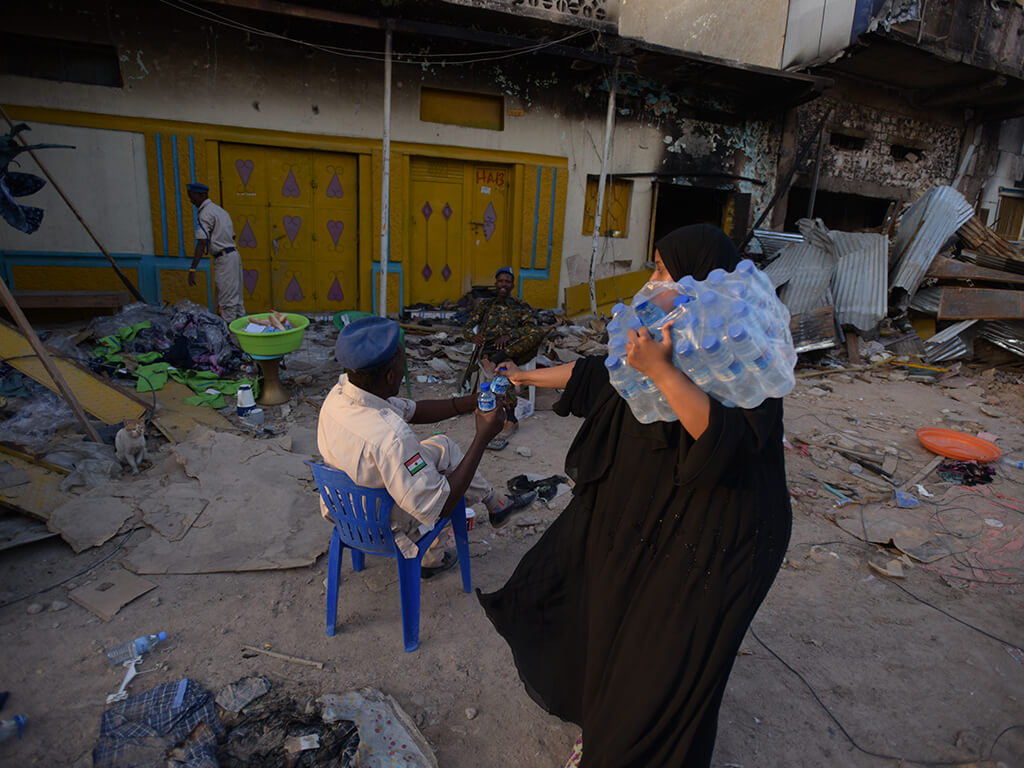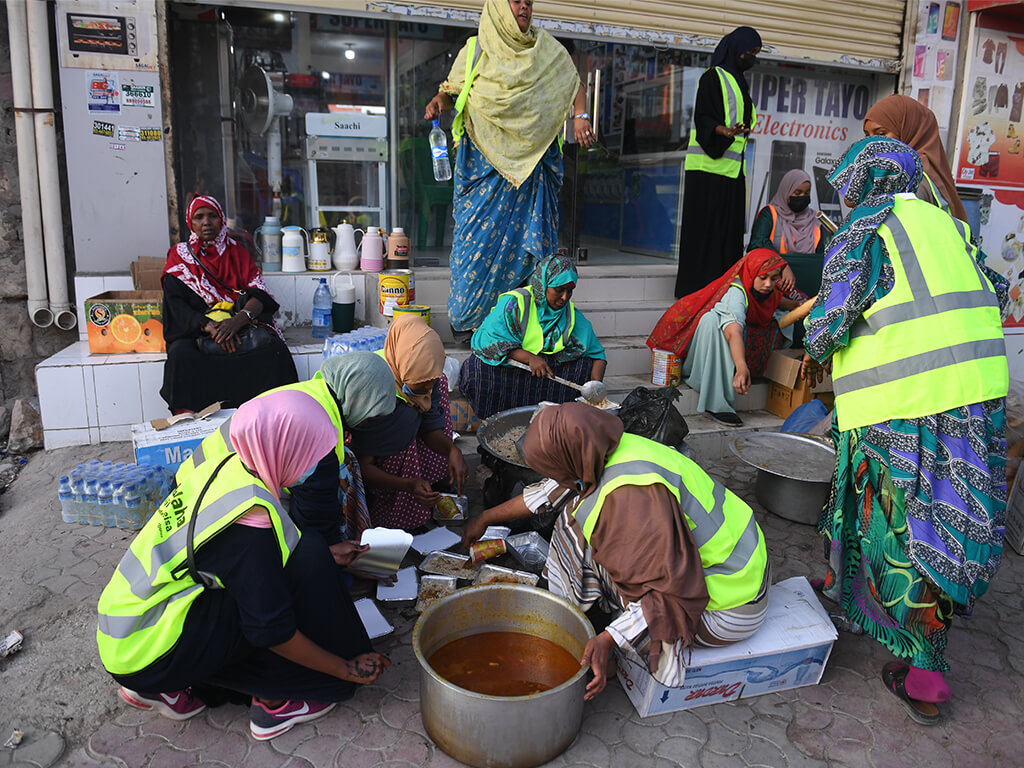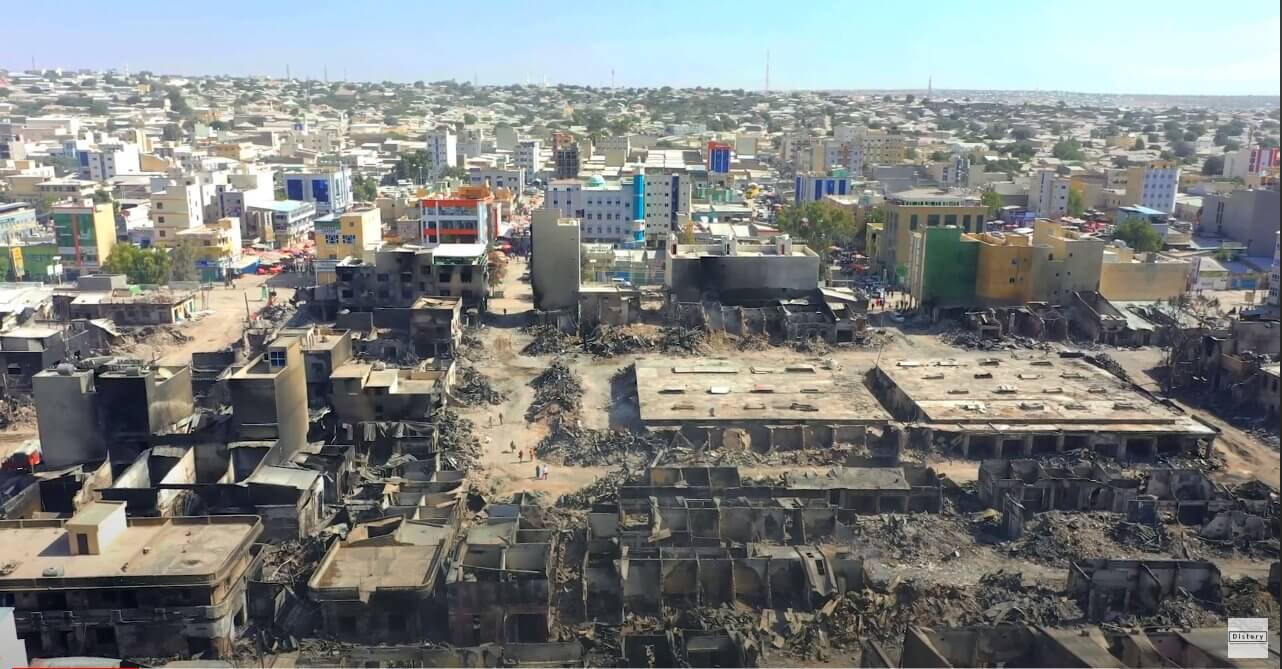
Everyone remembers where they were on the night of the fire. It was April Fool’s Day. And at around 8PM local time, some were already home and others on their way their. Others sat outside their shops, taking stock, balancing books and preparing for the next day. “I was here when the fire broke out,” Abdirahman Mohamed Cabdilahi says.
Abdirahman spent the better part of that evening helping his employer balance the books of what was a good day for business. He says he just heard people screaming outside that a fire had started.
“I went out and saw it. There was something strange about the flames. At the time we got out, the flames were rising,” he says.
Soon, the wind gathered speed and the fire increased in ferocity. All this time, dozens of people tried to fight it. Buckets of water were being passed from one hand to another but the final blow could not reach the belly of the flames. So it continued to consume everything in its path. Then the flames started to spread.
“The wind changed course and flattened the flame for a minute. This is when it spread across the entire market,”
Abdirahman says. “It was really quick. Before we got to our stores to save our goods, it had already turned everything into dust.”
At this time, confusion and panic had spread through the market. Everybody was trying to get to his or her shop to save as much property as they could. In the pandemonium, it was hard to differentiate those who were genuinely saving their goods and those who were looting.
When the flames quietened down, everything was gone. Swallowed either by the fire or disappeared in the hands of looters. As he talks, Abdirahman looks over to the spot where his shop once stood. He pauses for a while, as if imagining new t-shirts and dresses hanging from where the walls once stood. “Nothing survived. Not a single item. The entire market was destroyed. Nothing stood a chance.”

Somaliland is a breakaway, semi- desert territory on the coast of the Gulf of Aden. It declared independence after the overthrow of Somali dictator Mohammed Siad Barre in 1991. The territory is home to some 3.5million people and its major languages are Somali, Arabic and English. It’s capital Hargeisa is home to more than 1 million people, most of whom depend on trade for survival. Here, the fire not only destroyed property, but it brought down entire livelihoods.
For Abdirahman and those who traded next to him, the market represented an inimitable lifeline. In an economy and a territory that is just starting to gain international recognition, the market is many things to many people. The stalls provided employment to a bulging youthful population. In these jobs, the youth saw a future that would otherwise be out of reach for many of them. The stall owners, many of them second and third generation entrepreneurs saw, through the market, that life rewards drive and ambition.
Here market women stored their life earnings as well as important family documents such as birth certificates, business permits, passports, identity cards and many other important pieces of their past, present and futures in impenetrable safes.
“The town has never witnessed such a massive calamity,” Abdikarim Ahmed Moge, the Mayor of Hargeisa said.
The Hargeisa Chamber of Commerce Chairman Jamal Aideed said the loss of the market would be felt for months to come.
“Trade at the market accounted for between 40-60 per cent of the city’s economy,” he said.
On the morning of April 2nd, the magnitude of the loss started to hit home for many first responders and business owners who had only interacted with the loss in the cover of darkness. But when the sun rose, with the initial rays bouncing off the debris and cutting through the ash, a figure could be put to the damage. The country’s president said damages from the fire caused losses estimated at $2billion. To contextualize this, an erasure of 60 per cent of the region’s gross domestic product.
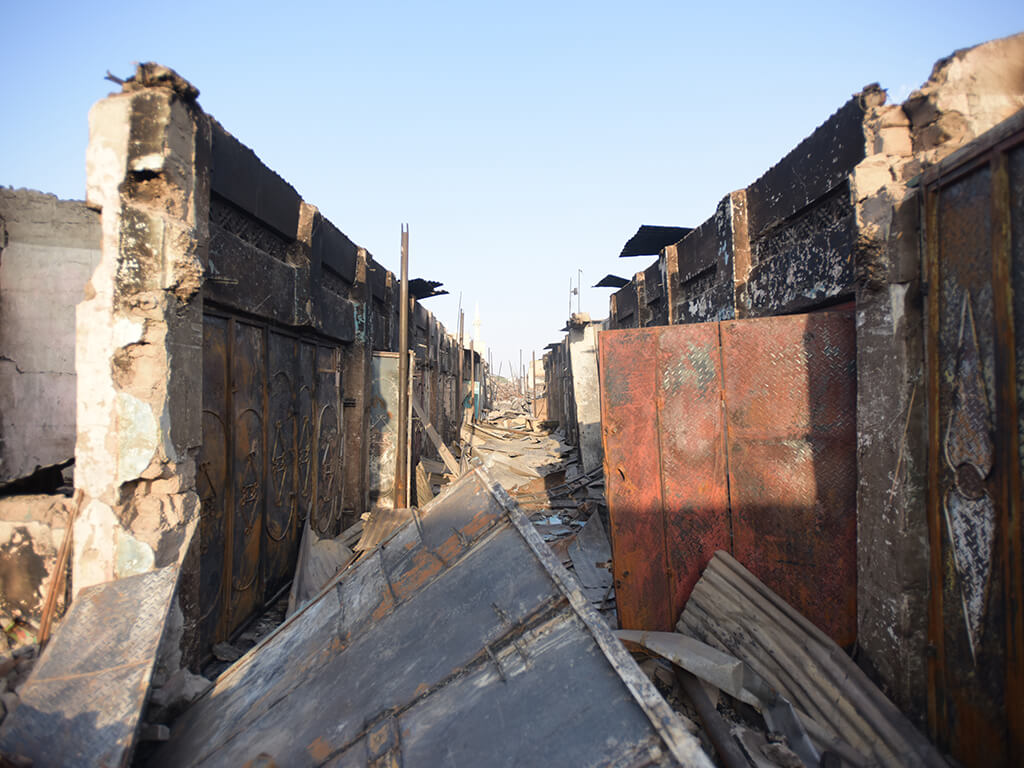
Everyone remembers where they were on the night of the fire.
There are those who were not at the market when the fire became angry.
“I was not there when it started,” Ciibado Cabdilaahi Ismaacil says. “But as soon as I heard the fire was touching everything I came.”
But she couldn’t stay for long when she got to the scene. Everything looked different. It was as if she was in a dream. Then she walked to where her shop once stood. There was only rubble. Pieces of plastic, wood and metal mixed with the cereal grains that represented her stock the day before was too much for her to bear.
“When I saw the place was still burning I left and saved myself. My entire livelihood had been destroyed. I had a lot of goods inside. Not one thing survived.”
Her shop was doing well. In it were barrels of henna. Turmeric powder. Qasil. Vats of sunflower. Perfumes. Baby feeding bottles. Sorghum. Oats. Beans. Her shop was responsible for the lives of two other family members. The next day, hoping that it was all a bad dream, she went to the market and as she combed through the rubble, Ciibado tripped and fell on her wrist, instantly breaking it.
Firefighters took her to hospital.
“They told me to rest for 30-40 days. They also told me to eat well,” she says.
Her hand though, is the least of her worries.
“Now we are just living. There is nobody to support us. I will wait for Allah’s will to be done.”
The central government and various aid agencies have registered traders in a bid to get them piece back their lives and livelihoods. Shelter. Financial support. Food and water provision. For now, every little gesture of goodwill counts.
Even in loss, Ciibado says she has something to be thankful for.“I will always thank God for how he grew my business,” she says. “I started by selling two kilograms of sorghum to selling it by the truckload.”
She says once her hand heals, she has no doubt that she will grow a bigger and better business.
Today though, the smell of smoke still hangs in the air. Ash still covers everything that witnessed the fire. There is a heaviness around the feet of those tasked with cleaning up the market. You can sense loss. You can feel regret. You can almost touch defeat.
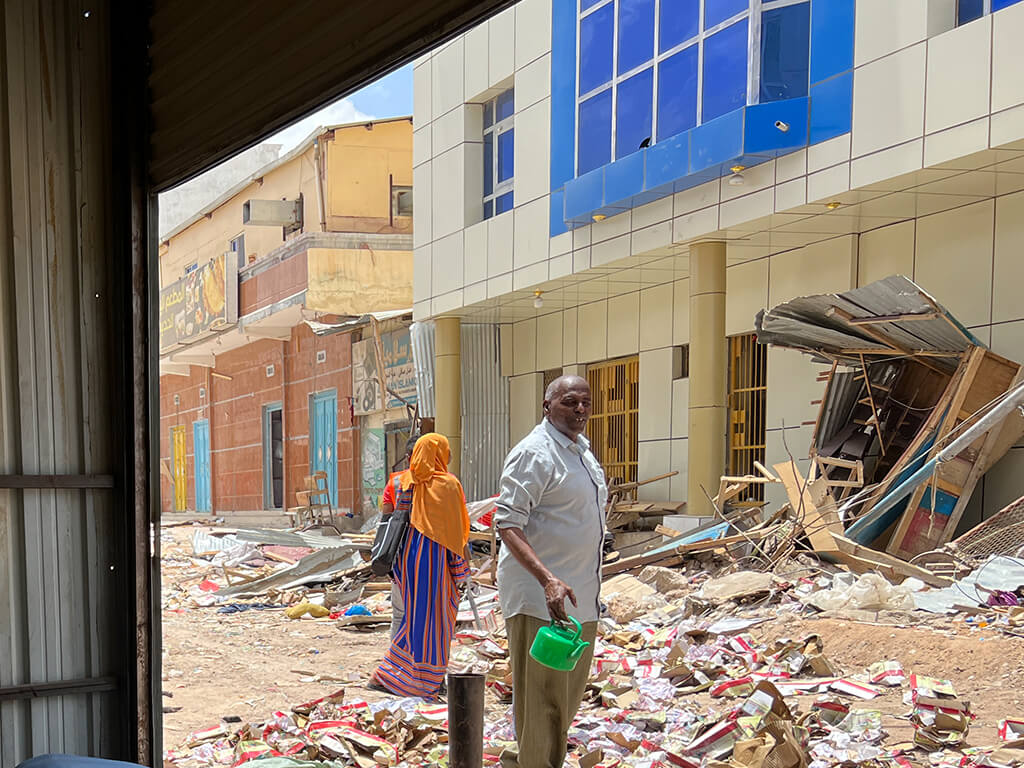
Everyone remembers where they were on the night of the fire. There are those who remember not just what the fire took away, but what it brought too.
“In one night, the fire took away the energy and the smiles of the people,” Samiya Hashi says.
A day after the inferno, Samiya left the comfort of her house to go to the market as she had done so many times before. This time though, it was different. The positive energy that rubbed off on her on every visit was not there. All the faces she saw that day had one thing in common, heartbreak.
“I realized it was my turn to help,” she says.
Samiya runs a YouTube Channel and Instagram page with tens of thousands of subscribers. On them she chronicles life in Somaliland. After the inferno, she turned to this online community for help.
“I did this because I was helpless and I knew what the traders felt. I knew I could do something to give them the comfort to get through their needs today and feed their families tomorrow. After that we will think about what to do to get their businesses up and running.”
With this in mind, Samiya put out a fundraising appeal to her online community.
“Within 24 hrs we had enough funds to get 35 people off the ground,” she says.“I wanted to see their smiles again.”
Waheen Market is an incredible place. When you walk into it, you will get an unmatched thrill from the hustle and bustle of those who make their living there. Here, nobody locks up when they leave and wads of cash are left unattended to when the owners go for prayers. Here when darkness sets in, people leave their goods as they are, and they will find them on the same exact spot the next day.
Today though, the smell of smoke still lingers in the air. Ash still covers everything that witnessed the fire. There is a heaviness around the feet of those tasked with cleaning up the market. You can sense loss. You can feel regret. You can almost touch defeat. But if you look into the eyes of the people who came to Waheen every day in search of a better life, you can also see determination. You can see the light of their souls pushing against approaching darkness. You can hear determination in every word they speak. If you sit still for long enough in the debris, you will hear the small still voice of belief and courage will stretch its arm and tap your shoulder to remind you of the endearing human spirit.
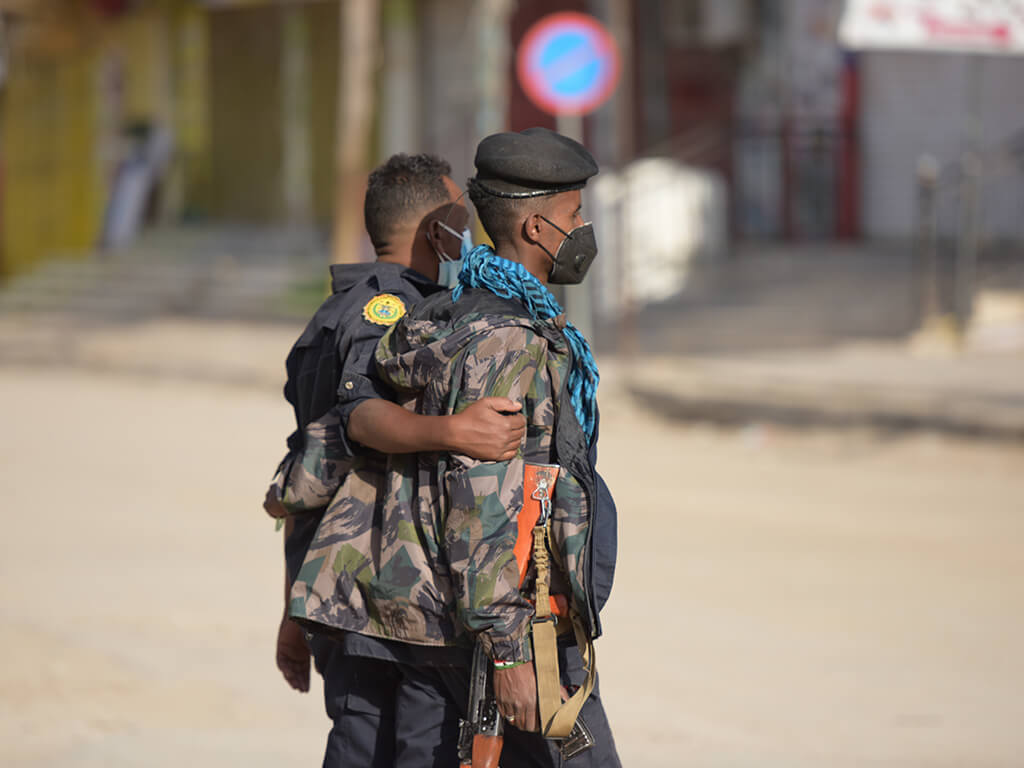
Loss can never really be quantified. Heartache can never really be measured. The only thing that loss affords you is the opportunity to heal, grow and learn from it.
“The biggest lesson we can learn from the fire is to start listening to each other and do right by one another,” Abdirahman, the young man employed as a shop attendant says.
He says all the traders stopped caring for each other by extending their shops into spaces meant for roads. He says there were numerous notices to shop owners to move out of road reserves. But nobody listened.
“On that night fire fighters could not make their way to the fire. They only put out the fire on the edges of the market but at the centre, everything burned down.”
He says there were entire roads that led straight into shops.
Like many around him though, he is not hanging his head in disappointment. He is moving on. New stock, ordered from neighbouring countries has already arrived.
“God willing we will get a bigger and brighter market. Better than the one we had before.”
Rebuilding efforts have started at the market. A corrugated iron fence runs around the its perimeter. Behind it lorries and tractors move the debris. Businessmen are still rummaging through debris on the spaces that were once enclosed by the walls of their shops hoping to find something that can get back onto their inventories.
Volunteers walk the streets with water bottles, handing them out to those involved in the clean-up. And when the call for prayer is made, Muslim faithful put aside their shovels and heed it. Here, although destruction is visible, the traders at Hargeisa market are driven by something many times more powerful than the inferno.
They are driven by belief. The belief of the possibility of a better future.
